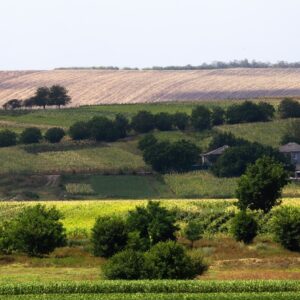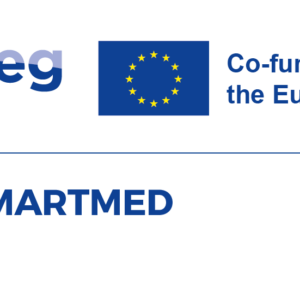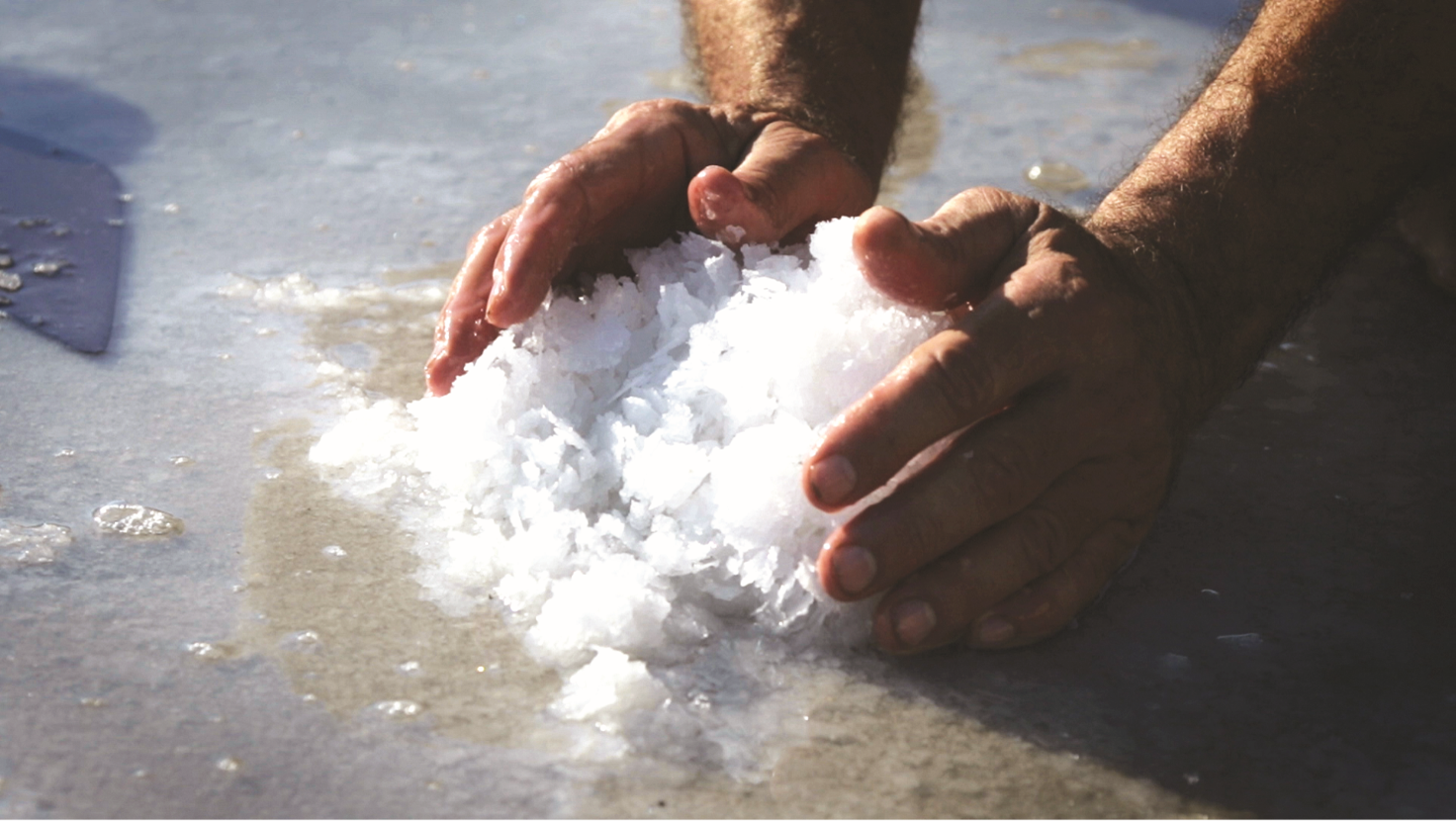
Artisanal salt-making and salinas can be considered part of the Mediterranean cultural and natural heritage. However, their sustainable development faces many obstacles today. In this sense, branding can be a powerful instrument to enhance their visibility, increase their market share and promote ecological management practices. Indeed, a well-crafted branding strategy can help build trust with customers and promote Salinas products as natural, eco-friendly, and sustainable.
The Significance of Branding for Salt Salinas
According to Keller and Lehmann (2006), branding is “a multidimensional construct that encapsulates a multitude of perspectives, including products, services, organizations, people, and countries, among others” (p. 465). They further define it as “the process of creating a unique name and image of a product, service, or organization in the minds of customers and other stakeholders” (Lehmann, Brands and Branding: Research Findings and Future Priorities, Vol. 25, No. 6, 25th Anniversary Issue (Nov. – Dec. 2006)).
In the case of the Salinas, branding helps to create a distinct identity for the product, making it easier for consumers to recognize and remember it. This is particularly crucial in a crowded market, where differentiation is necessary to stand out. Branding can also help to communicate the core message or purpose of the Salinas, highlighting the exceptional quality of the products and the sustainable practices and unique features.
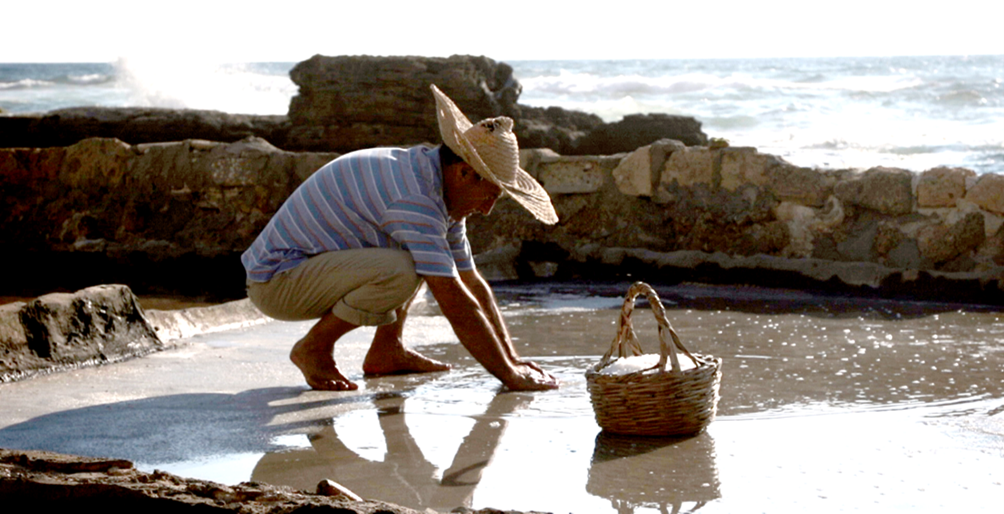 Preserving Tradition: The Art of Hand-Harvesting Lebanese Sea Salt
Preserving Tradition: The Art of Hand-Harvesting Lebanese Sea Salt
Branding Four Salinas from Lebanon: Successes and Challenges Faced
The MedArtSal project has played a crucial role in branding the artisanal salt produced by four Salinas from Lebanon, namely Al-Najjar Salinas (Blanc Sel), Georges Sleiman Salinas (Evaura), Malek Salinas (Sea Jewels) and Salacia Beach and Resort. This branding initiative involved packaging, labeling, and creating a visual identity for the salt products. While the task of branding Salinas posed several challenges, the rewards have been significant.
To ensure the effectiveness of the branding, it was essential to identify an attractive type of packaging, allowing to feature a logo which evokes salt, nature, and the Mediterranean to create an emotional connection with consumers. By supporting the branding or rebranding of artisanal salinas, MedArtSal project has provided the managers of Salinas tangibles tools to find their unique selling proposition. Thanks to this, they are now better able present to their brand and product, enhancing their visibility and increasing their market share.
Anfeh: A Cultural and Culinary Destination with a Legacy of Salt
Anfeh, an ancient Lebanese town situated on the coast of the Mediterranean Sea, is more than just a touristic destination. The town boasts a rich cultural heritage and is home to one of the world’s oldest salt production locations. The Phoenicians established salt ponds on the rocky shores of Anfeh, and even Cuneiform tablets from 1,400 BC describe the town’s high-quality salt. Anfeh’s traditional salt harvesting method is what makes its salt so unique, resulting in salt that is incredibly rich in flavor and texture, enhanced naturally by the beams of the sun and the pure salinity of the Mediterranean.
Anfeh is home to Lebanon’s only remaining traditional Salinas and artisanal salt producers. UNESCO recognized the cultural heritage and unique landscape of the areas of “Ras al-Qalaat,” “Ras el-Mlelih,” and “Ras Al Natour” in Anfeh by accepting their registration on the preliminary list of World Heritage in 2019. This recognition not only allows tourists to experience cultural heritage but also to savor the highest quality artisanal salt while supporting sustainable local development. A compelling and nostalgic storytelling was developed to showcase Anfeh’s charm. Additionally, a unique story was crafted for each of the four Salinas, highlighting the history of the Salina and the art of crafting salt in an artisanal way while preserving heritage and promoting sustainability.
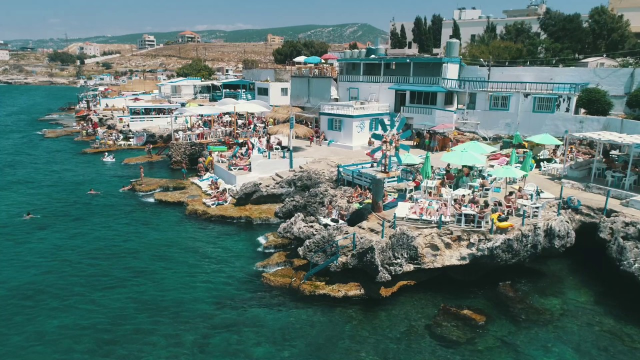 The Captivating Beauty of Anfeh, Lebanon
The Captivating Beauty of Anfeh, Lebanon
Blanc Sel by Al-Najjar Salinas
Blanc Sel by Al-Najjar Salinas is a brand that represents the unique artisanal salt produced by the Al-Najjar Salinas in Lebanon. The challenge in creating the brand’s logo was to add a feminine touch without making it overtly feminine. A first logo was already crafted but Al-Najjar were not satisfied but wanted to keep the jewel cut. The solution was to use blue shades and salt crystals in an artisanal way to emphasize the fact that both men and women craft the salt. This creative approach has allowed Blanc Sel to represent the values of tradition, quality, and sustainability that the Al-Najjar Salinas stand for. Through the branding implemented, Blanc Sel has become not only a product but also a representation of the history and culture of artisanal salt production in Lebanon.
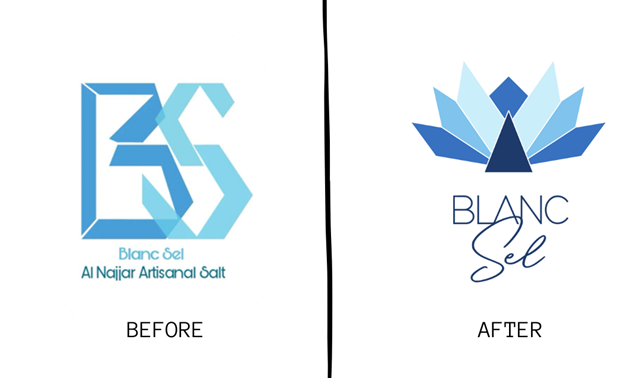 Blanc Sel Logo: Before and After Branding
Blanc Sel Logo: Before and After Branding
Evaura by Georges Sleiman Salinas
Crafting a cohesive branding strategy for Evaura presented several challenges. One of the major challenges was due to the economic situation in Lebanon and the high prices of materials. In order to maintain a cost control, the project team suggested the use of metallic bags with transparent fronts instead of expensive glass jars. In addition, the wide range of products offered by Evaura, from fine salt to flavored food salt and scrubs, needed to maintain a consistent brand identity while differentiating each product line. The team presented several directions, and ultimately chose to use a palette of colors to create a unified look and feel across all products. Despite these challenges, the branding strategy for Evaura successfully communicates a commitment towards artisanal, high-quality products made by Georges Sleiman Salinas.
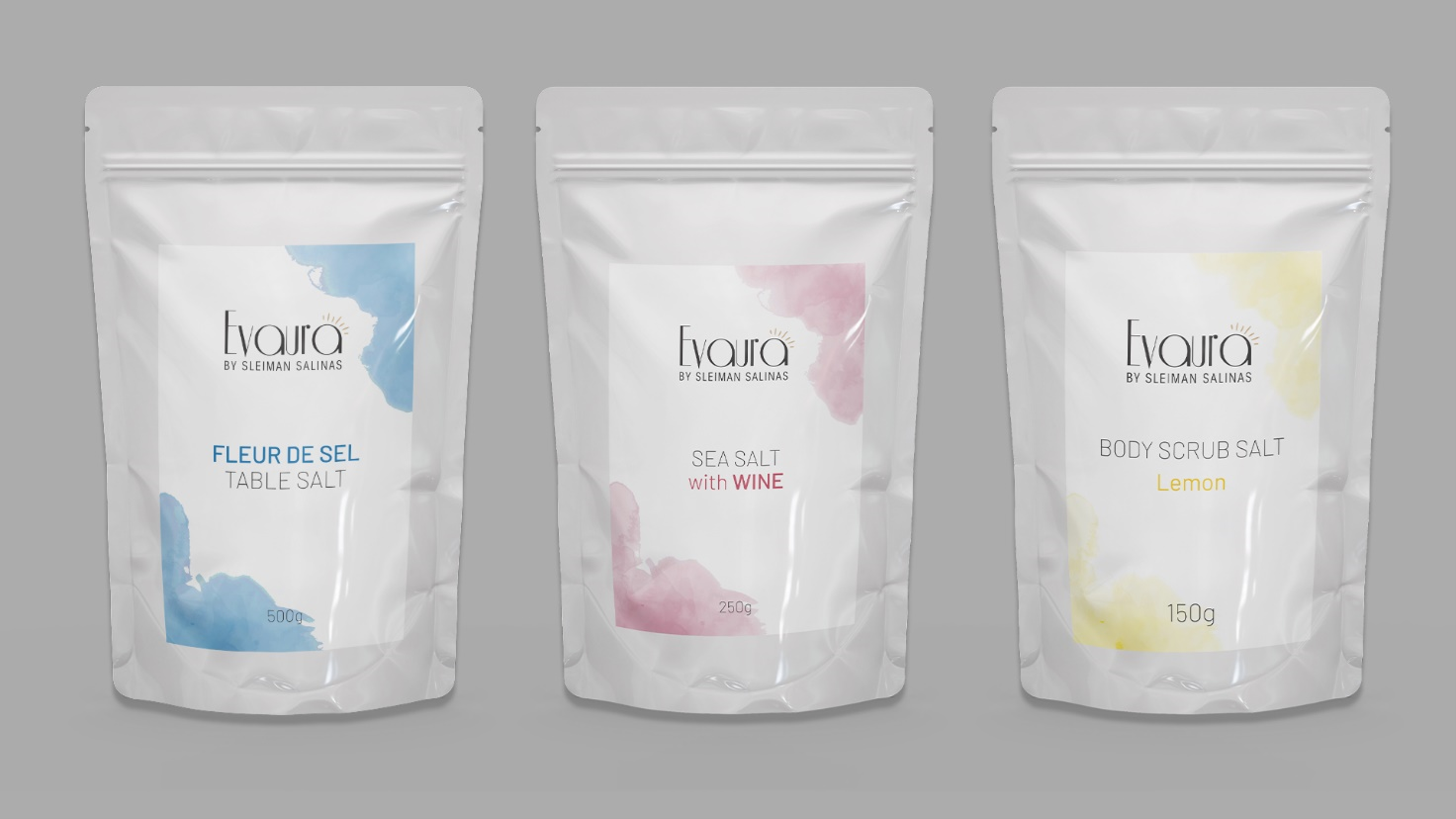 Evaura Packaging Showcase: A Unified Brand Identity Across Three Product Lines
Evaura Packaging Showcase: A Unified Brand Identity Across Three Product Lines
Sea Jewels by Malek Salinas
For “Sea Jewels” crafted by Malek Salinas, the branding process began from scratch with the selection of a suitable name. After presenting several options to Imad Malek, he chose “Masal” which combined “Ma” from Malek with “Sal” from Salinas. However, he later decided to change the name and ended up with “Sea Jewels” which required a complete rebranding process. Throughout the process, different logo options were presented, including designs featuring a pelican, Anfeh traditional windmill, and the sun and sea. Ultimately, a logo was created that aligned with Imad Malek’s vision and captured the essence of the brand with an artistic representation of the sea and jewels. Despite the challenge of starting from scratch, Sea Jewels now offers a modern, artistic gourmet salt product with a unique identity.
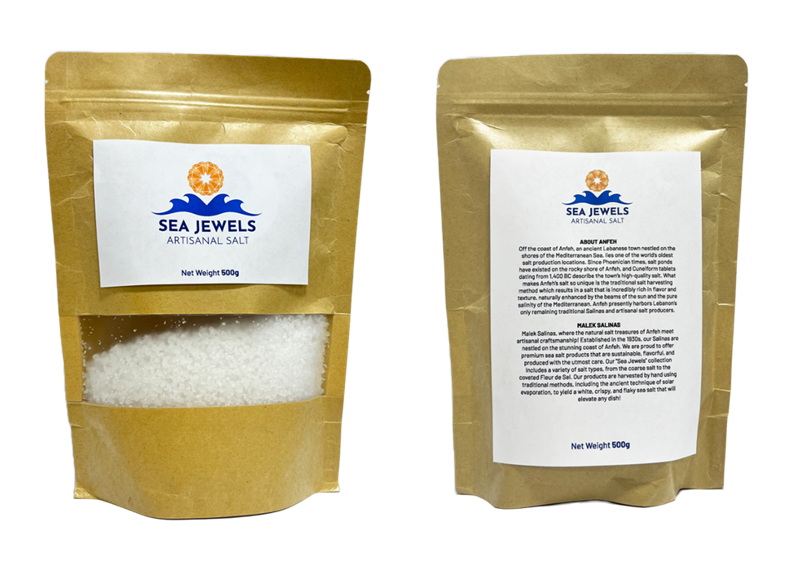 A New Identity for Sea Jewels
A New Identity for Sea Jewels
Salacia Beach and Resort
When it comes to branding Salacia Beach and Resort, the challenge was to create a cohesive identity for a wide range of elements that were not linked to each other. This lack of a defined identity and clear direction made the branding process difficult, as many different branding elements were already present and each seemed to be going in a different direction. To overcome this challenge, underplates and discount brochures were created, and the napkin stand and jar labels for salt and seaweeds were branded to give a sense of unity and a consistent identity.
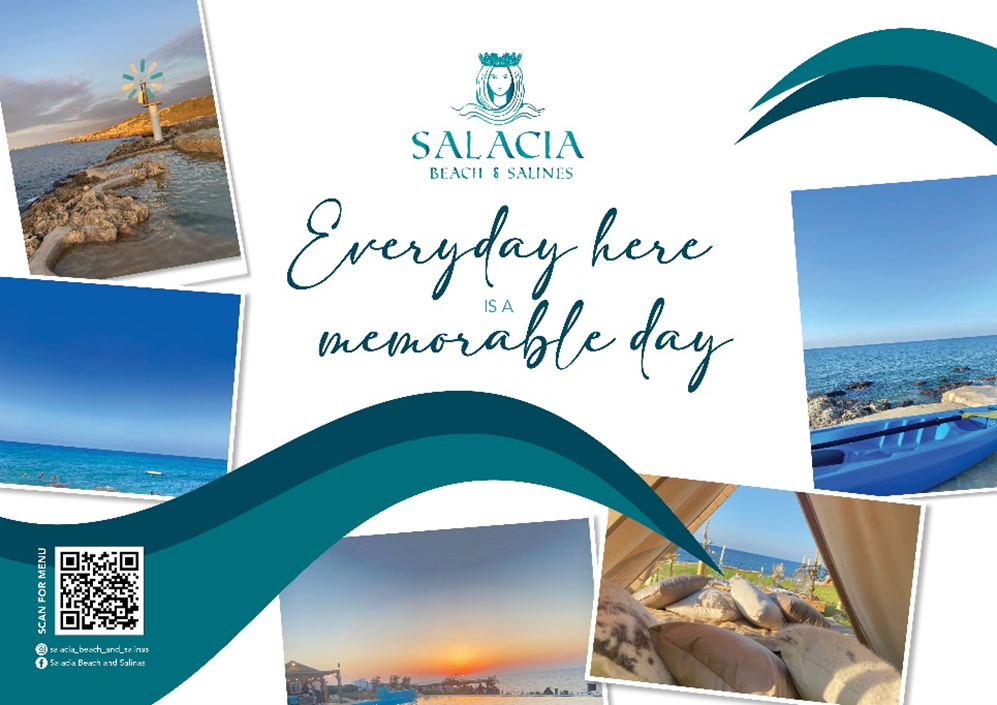 Summer Vibes: Salacia Beach and Resort Placemat
Summer Vibes: Salacia Beach and Resort Placemat
Effect of Branding on Sustainability and Tourism for Artisanal Salt Salinas
Branding of artisanal salt Salinas can have a significant impact on sustainability and tourism. Developing a recognizable and trusted brand, can influence customers to purchase from artisanal knowing that their purchase is contributing to sustainability efforts. Additionally, choosing sustainable packaging materials like recycled paper or cardboard is an important way for Salinas to reduce their environmental footprint. This packaging can also be used to inform customers about their commitment to sustainability and help build trust in their brand. On the other hand, by promoting the unique features of the salt and highlighting their ecological management practices, branding can attract eco-conscious tourists, leading to increased demand and higher prices. This can, in turn, enhance the economic viability of the Salinas, leading to their long-term preservation.
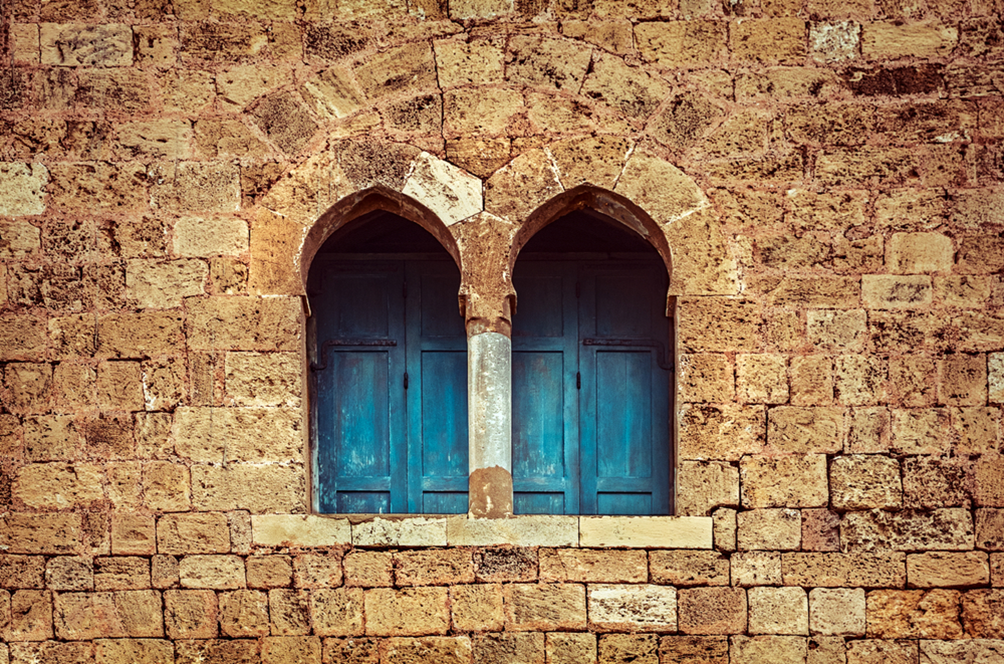 Anfeh’s Charming Heritage: A Captivating House with Iconic Blue Windows
Anfeh’s Charming Heritage: A Captivating House with Iconic Blue Windows
Anfeh’s Charming Heritage: A Captivating House with Iconic Blue Windows
The MedArtSal project, funded by the European Union under ENI CBC MED Programme , in partnership with the University Consortium for Industrial and Managerial Economics (Italy), Fair Trade Lebanon (Lebanon), the Association for the Development of Rural Capacities (Lebanon), the International Union for Conservation of Nature Centre for Mediterranean Cooperation (Spain), the Mediterranean Sea and Coast Foundation (Italy), the Saida Society (Tunisia), the University of Cádiz (Spain), and the Tuniso-Italian Chamber of Commerce and Industry (Tunisia), aims to preserve the Mediterranean artisanal Salinas, assure production continuity, as well as stimulate the local economy and territorial cohesion.
Article provided by the project partner Fair Trade Lebanon. MedArtSal is a project funded by ENI CBC MED Programme. More info about on our dedicated page and on the official website.

 IT
IT 
